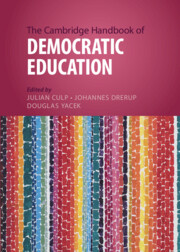14 results
Appendix 2
- from 26 - Wealth Stratification in US Higher Education and Democratic Education, 1890s–2020s
-
- Book:
- The Cambridge Handbook of Democratic Education
- Published online:
- 20 April 2023
- Print publication:
- 27 April 2023, pp 450-455
-
- Chapter
- Export citation
1 - What Is Democratic Education and Why Should We Care?
- from Introduction
-
-
- Book:
- The Cambridge Handbook of Democratic Education
- Published online:
- 20 April 2023
- Print publication:
- 27 April 2023, pp 3-10
-
- Chapter
- Export citation
Appendix 1
- from 26 - Wealth Stratification in US Higher Education and Democratic Education, 1890s–2020s
-
- Book:
- The Cambridge Handbook of Democratic Education
- Published online:
- 20 April 2023
- Print publication:
- 27 April 2023, pp 449-449
-
- Chapter
- Export citation
Introduction
-
- Book:
- The Cambridge Handbook of Democratic Education
- Published online:
- 20 April 2023
- Print publication:
- 27 April 2023, pp 1-10
-
- Chapter
- Export citation
Index
-
- Book:
- The Cambridge Handbook of Democratic Education
- Published online:
- 20 April 2023
- Print publication:
- 27 April 2023, pp 628-632
-
- Chapter
- Export citation
Copyright page
-
- Book:
- The Cambridge Handbook of Democratic Education
- Published online:
- 20 April 2023
- Print publication:
- 27 April 2023, pp iv-iv
-
- Chapter
- Export citation
Part Two - Philosophical and Normative Foundations
-
- Book:
- The Cambridge Handbook of Democratic Education
- Published online:
- 20 April 2023
- Print publication:
- 27 April 2023, pp 127-260
-
- Chapter
- Export citation
Part Four - Challenges
-
- Book:
- The Cambridge Handbook of Democratic Education
- Published online:
- 20 April 2023
- Print publication:
- 27 April 2023, pp 433-627
-
- Chapter
- Export citation
Part Three - Key Topics and Concepts
-
- Book:
- The Cambridge Handbook of Democratic Education
- Published online:
- 20 April 2023
- Print publication:
- 27 April 2023, pp 261-432
-
- Chapter
- Export citation
Acknowledgments
-
- Book:
- The Cambridge Handbook of Democratic Education
- Published online:
- 20 April 2023
- Print publication:
- 27 April 2023, pp xi-xii
-
- Chapter
- Export citation
Part One - Historical Perspectives
-
- Book:
- The Cambridge Handbook of Democratic Education
- Published online:
- 20 April 2023
- Print publication:
- 27 April 2023, pp 11-126
-
- Chapter
- Export citation
Contents
-
- Book:
- The Cambridge Handbook of Democratic Education
- Published online:
- 20 April 2023
- Print publication:
- 27 April 2023, pp v-vii
-
- Chapter
- Export citation
Contributors
-
- Book:
- The Cambridge Handbook of Democratic Education
- Published online:
- 20 April 2023
- Print publication:
- 27 April 2023, pp viii-x
-
- Chapter
- Export citation

The Cambridge Handbook of Democratic Education
-
- Published online:
- 20 April 2023
- Print publication:
- 27 April 2023



